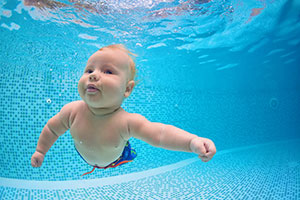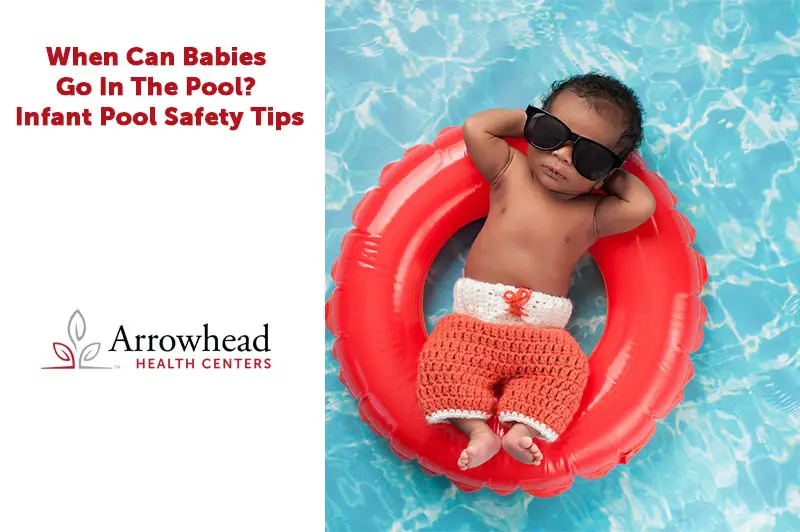Babies can go in the pool when they are at least 6 months old. Introducing babies to the pool can be an exciting and fun experience.
However, it is important to wait until your little one is at least 6 months old before taking them for a dip. This is because babies younger than 6 months have not yet developed the necessary skills to regulate their body temperature in water.
Additionally, their immune systems are not fully developed, making them more susceptible to germs in the pool. Once your baby reaches 6 months, they are better equipped to handle the pool environment. However, be sure to choose a pool with warm water and a clean, safe environment. Always supervise your baby closely, use appropriate swim gear, and start with short sessions to help them adjust gradually.
Introducing Babies To The Pool
Benefits Of Early Pool Introduction
Introducing babies to the pool at an early age can have numerous benefits for their physical, cognitive, and emotional development. It can help them become familiar with the water, improve their coordination, and enhance their muscle strength. Additionally, it can foster a positive attitude towards physical activity and water safety.
Considerations Before Taking A Baby To The Pool
Before bringing your baby to the pool, it’s crucial to consider certain factors to ensure their safety and enjoyment. This includes checking the water temperature to make sure it’s comfortable for your baby, ensuring the pool is clean and well-maintained, and verifying that there are appropriate infant flotation devices available. Furthermore, it’s important to choose a time when the pool is not crowded to minimize potential hazards and distractions.

Credit: www.babycenter.com
Safe Age For Baby’s First Pool Experience
Baby’s first pool experience is an exciting milestone, but it’s essential to ensure the timing is right for their safety and enjoyment. Determining the safe age for babies to go in the pool involves considering pediatrician recommendations and understanding the physical development milestones for pool readiness.
Pediatrician Recommendations
Pediatricians typically suggest that babies can start swimming in a pool when they are about six months old. By this age, most babies have developed sufficient head control and muscle strength to support themselves in the water. It’s crucial to consult with a pediatrician to assess the individual readiness of your baby for pool activities. Always prioritize safety and look out for any specific recommendations based on your baby’s health and development.
Physical Development Milestones For Pool Readiness
Before introducing your baby to the pool, consider their physical development milestones. Babies should be able to hold their head up steadily, sit with support, and have some level of coordination and motor skills. Keep in mind that every baby develops at their own pace, so it’s important to observe your child’s readiness rather than strictly adhering to age guidelines.
Preparing For Baby’s Pool Time
Babies can go in the pool once they are six months old and have good head control. It’s important to ensure the water is warm, the pool is properly sanitized, and you have the necessary swim gear for your little one’s safety.
Preparing for Baby’s Pool Time Choosing the Right Pool Environment When taking your baby to the pool, ensure the water is clean and properly treated. Keep the pool temperature around 85 degrees Fahrenheit for the baby’s comfort. Look for pools with shallow areas for infants to splash safely. Essential Pool Safety Gear for Infants Invest in a properly fitted swim diaper to prevent accidents in the pool. Have your baby wear a comfortable and secure fitting swim float for added safety. A sun hat and baby-friendly sunscreen are crucial to protect their delicate skin. Table: Pool Safety Gear Checklist for Infants | Item | Description | |————————|——————————————–| | Swim diaper | Prevents accidents in the pool | | Swim float | Keeps baby secure in the water | | Sun hat | Shields baby’s head from sun | | Baby-friendly sunscreen| Protects delicate skin from sun exposure | Remember to always keep a close eye on your baby when they are in or near the pool. Taking these precautions will ensure a safe and enjoyable experience for your little one in the water.
:max_bytes(150000):strip_icc()/GettyImages-1158387529-442ba7abd351420fa5c49b1b3e7ff34e.jpg)
Credit: www.verywellfamily.com
Guidelines For A Positive Pool Experience
Discover the ideal time for babies to start pool adventures with these essential guidelines. Ensure a positive pool experience by following expert recommendations for introducing infants to the water. Prepare for safe and enjoyable aquatic play with practical tips for parents and caregivers.
Introducing your baby to the pool can be an exciting and memorable experience. However, it’s essential to follow some guidelines to ensure a positive pool experience for your little one. From gradual exposures to water to recognizing signs of readiness, these practices will help you make the most out of your baby’s swimming adventures.
Gradual Exposures To Water
To ensure a safe and enjoyable pool experience for your baby, it’s crucial to introduce them to water gradually. Start by letting them explore the sensation of water on their hands and feet. Using a small basin or a sprinkler, allow your baby to dip their fingers and toes into the water. This gradual approach will help them become familiar with water and build their confidence. As your baby becomes comfortable, you can slowly increase their exposure by pouring water gently over their body. Remember to maintain a calm and soothing environment to create a positive association with water.
Signs Of Baby’s Readiness For Pool Activities
Knowing when your baby is ready for pool activities is important for their safety and enjoyment. Look out for these signs to determine if your little one is prepared to take the plunge: 1. Head Control: Ensure that your baby has developed sufficient neck and head control to hold their head up while in water. This is essential to prevent accidental submersion and maintain a clear airway. 2. Interest in Water: Observe if your baby expresses curiosity or excitement when they see or hear water. Showing interest in water-related activities is a good indication that they might be ready to explore the pool. 3. Ability to Sit Unassisted: Before introducing your baby to the pool, make sure they have developed the ability to sit unsupported. This skill demonstrates increased trunk stability, enabling them to sit and float comfortably in the water. 4. Reflux or Digestive Concerns: If your baby experiences frequent reflux or digestive issues, it’s best to consult a healthcare professional before taking them to the pool. They can provide guidance on when it is safe for your little one to engage in water activities. 5. Physician’s Approval: When in doubt, seek your pediatrician’s advice. They can assess your baby’s individual development and offer specific recommendations tailored to your child’s needs. By following these guidelines and recognizing the signs of your baby’s readiness, you can create a positive and enjoyable pool experience for both you and your little one. Remember to prioritize safety, provide constant supervision, and make swimming sessions a fun and bonding time for you and your baby.
Health Considerations & Precautions
Before taking your baby to the pool for the first time, it’s essential to understand the health considerations and precautions involved. Ensuring your baby’s safety and well-being is of utmost importance, so it’s crucial to be aware of how to protect their delicate skin and regulate their hydration and body temperature in a pool environment. Let’s explore these aspects in detail.
Skin Protection In The Pool
When it comes to your baby’s skin, some extra care is necessary when swimming in a pool. The chlorine and other chemicals used to keep the pool water clean can cause dryness and irritate their sensitive skin. To protect your little one, here are some tips:
- Apply a water-resistant sunscreen with a high SPF to protect your baby’s skin from harmful UV rays.
- Choose a swimsuit that covers most of their body to provide an additional layer of protection.
- Rinse your baby’s skin with fresh water immediately after leaving the pool to remove any chlorine residue.
- Apply a baby-safe moisturizer to keep their skin hydrated and prevent dryness.
Hydration And Temperature Regulation Tips
Babies are more susceptible to dehydration and temperature fluctuations in a pool setting. Here are some simple yet effective tips to ensure they stay comfortable and well-hydrated:
- Offer your baby small sips of water frequently throughout their time in the pool to prevent dehydration.
- Make sure the water temperature in the pool is warm enough for your baby’s delicate skin. Ideally, it should be around 32°C (90°F).
- Watch for signs of overheating, such as flushed skin, excessive sweating, or fussiness, and take your baby out of the water if any of these symptoms occur.
- Take regular breaks from swimming to allow your baby to rest and regulate their body temperature.
By keeping these health considerations and precautions in mind, you can create a safe and enjoyable swimming experience for your baby. Remember, their health and well-being should always be the top priority, so take the necessary steps to ensure a fun and worry-free time in the pool!
Common Pool Safety Concerns For Babies
Babies are highly vulnerable near pools, necessitating strict safety measures. Understanding drowning risks and how to prevent them is crucial. Equally important is safe handling of pool chemicals in the presence of infants.
Drowning Risks And Prevention
- Active adult supervision is key to preventing drowning incidents.
- Ensure pool gates are secure to restrict baby’s access to the pool area.
- Use appropriate flotation devices but never rely on them solely.
- Teach babies basic water safety skills as an additional preventive measure.
Handling Pool Chemicals Safely Around Infants
- Store pool chemicals securely out of babies’ reach to avoid accidental ingestion.
- Always follow manufacturer’s instructions when handling and storing chemicals.
- Wear protective gear like gloves and masks when handling pool chemicals.
- Rinse off any chemicals from your body thoroughly before interacting with babies.
Fun Pool Activities For Babies
Welcome to an exciting world of fun pool activities for babies! Introducing little ones to the pool can be an enjoyable and educational experience for both parents and babies alike. From simple water play to developmental swim classes, there are numerous ways to create lasting memories and foster a love for the water at an early age. Let’s explore the enriching potential of water activities for babies and the benefits they can offer.
Introduction To Water Play
Water play offers a wonderful opportunity for babies to experience the joy of being in the pool. From splashing around to playing with floating toys, water play helps babies familiarize themselves with the pool environment and develop a positive association with water.
Swim Classes And Bonding Time In The Pool
Enrolling babies in swim classes not only introduces them to essential water safety skills but also provides an avenue for bonding time with parents. These classes often incorporate engaging activities designed to promote confidence in the water and further enhance the parent-baby relationship.
Building Lifelong Water Confidence
Introducing your baby to the pool at an early age can help build lifelong water confidence. By familiarizing them with the water from a young age, you can instill a positive relationship with swimming and water activities. This can have numerous benefits for their physical and mental development.
Benefits Of Early Water Exposure For Baby’s Development
Early exposure to water can have a profound impact on your baby’s development. It can help improve their coordination, balance, and muscle strength. Moreover, it can enhance their sensory experiences and cognitive development. Babies who are introduced to the pool early often exhibit more confidence and comfort around water as they grow older.
Encouraging A Positive Relationship With Swimming
Creating a positive association with swimming is crucial for cultivating a love for the water. By starting early and ensuring positive experiences, you can build a strong foundation for future swimming endeavors. This can lead to a lifelong appreciation for water-based activities, as well as valuable water safety skills.

Credit: arrowheadhealth.com
Conclusion
Planning a fun pool day with your baby? Remember, safety first. Start slow, ensure a proper sunscreen application, and make sure the water temperature is comfortable for your little one. Always supervise them closely and have fun bonding in the pool together.
Enjoy those precious moments by the water!





